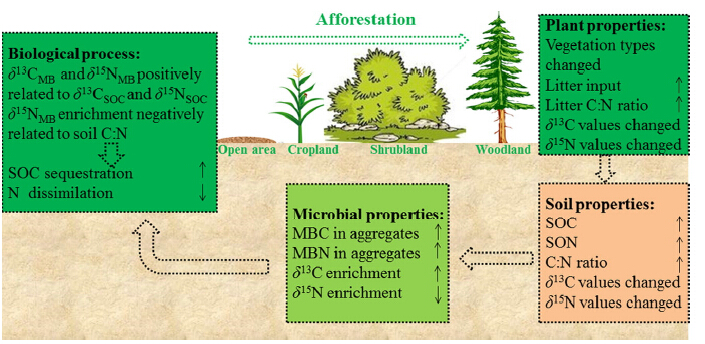
Afforestation greatly impacts the soil physicochemical and biological characteristics by altering plant species and the quantity and quality of substrates inputs. The mean δ13C of organic soil reflects the δ13C signal of plant litter input, and hence, the microbial use of C derived from plant material of varying qualities can be assessed. However, the factors controlling the microbial C and N isotope composition are still unknown at present.
Under the supervision of Prof. CHENG Xiaoli, WU Junjun from Wuhan Botanical Garden conducted a study in Danjiangkou Reservoir region of central China to investigate how afforestation impacts soil microbial biomass and its natural abundance of 13C and 15N in soil aggregate sizes, and the relationship of δ13C and δ15N of microbial biomass as well as the13C and 15N enrichment of soil microbial biomass with soil C and N availabilities following afforestation.
This study demonstrated that afforested soils averaged higher microbial biomass carbon and nitrogen levels in all aggregates than in open area and cropland, with higher microbial biomass in micro-aggregates (< 250 μm) than in macro-aggregates (> 2000 μm). The δ13C of soil microbial biomass was more enriched in woodland soils than in other land use types, while δ15N of soil microbial biomass was more enriched compared with that of organic soil in all land use types.
The δ13C and δ15N of microbial biomass were positively related to the δ13C and δ15N of organic soil, suggesting plant species shift following afforestation would affect the soil δ13C and δ15N values with litter inputs and further impact the δ13C and δ15N of microbial biomass. Whereas the 13C and 15N enrichment of microbial biomass linearly decreased with the corresponding C: N ratio of organic soil.
This study suggests the shifts in the natural 13C and 15N abundance of microbial biomass reflect changes in the stabilization of soil organic matter following afforestation, which impacts the long-term organic matter accumulation and sustainable development of afforestation ecosystems.
This research was financially supported by the National Natural Science Foundation of China, and the Strategic Priority Research Program B of the Chinese Academy of Sciences. Results have been published in Science of the Total Environment entitled “Afforestation impacts microbial biomass and its natural13C and15N abundance in soil aggregates in central China".

Conceptual model illustrating the relationship between δ13C and δ15N of microbial biomass and soil C and N availabilities (Image by WU Junjun)

86-10-68597521 (day)
86-10-68597289 (night)

52 Sanlihe Rd., Xicheng District,
Beijing, China (100864)

